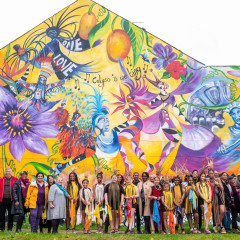We love to laugh. From stand up comedy to meme pages, there is plenty out there to help us through the tougher days in life. The sitcom is one of these. Britain has an endless list of situational comedies that cover the country top to bottom, focusing on people from all walks of life. The usually underrepresented north has a strong position in the sitcom world. Many beloved sitcoms nationwide are set in the north, such as The Royle Family, Last of the Summer Wine, Dinnerladies, and in my opinion are some of the best presentations of northern working-class life.
When you think of the north on screen Ken Loach’s Kes or Shane Meadows’ This is England springs to mind. Both are incredible (and in the latter’s case often harrowing) portrayals of working class life, yet what makes them stand out is that it isn’t all doom and gloom. Personal tragedies are fused with love and friendship, and most significantly humour. It is this which lifts these films from social commentary and allows them to represent real people.
Contrastingly, the main component of northern sitcoms are, of course, the comedy. Social issues are less prominent, referenced in a joke, or linger in the background. At the forefront of these shows, and why they are so good, is the celebration of northern life. The love of a family, or a group of colleagues, that is never spoken, but instead hinted at in the constant bickering and insults. Despite their circumstances there is a warm joy that can be ignored in socio-economic commentaries of northern working-class life.
Dinnerladies is a perfect example of this warmth. Set in a factory, its focus is on the group of people who work in its canteen. It stars Victoria Wood as Bren, a woman who muddles along with her work everyday, in a very British, non complaining way. At the heart of the show is her romance with Tony the canteen manager, who side-step around their attraction for each other during most of the series, never properly divulging their feelings until the end. It doesn’t feel as forced as a will-they-won’t they Ross/Rachel kind of thing. There’s a genuine fear of telling someone you like them, something everyone watching can relate to.
There is a hint of darkness as Bren suffers from low self esteem, probably because of her problematic mother who abandoned her. She is an utterly believable and developed protagonist. Yet her main purpose is as the heart and warmth of the show, solving her colleagues' problems and often is the one with the quick quips.
Two of the characters, Jean and Dolly, are the older women working in the canteen. Their whole relationship involves them making snarky remarks towards each other, but it never feels mean – you are certain it comes from a place of love. That is what is essential to the success of this sitcom.
There is mutual love and respect amongst all of the characters that isn’t necessarily obvious, yet you can just feel it. A community of people working together and having each others’ backs is an incredibly refreshing presentation of working-class life in the north. This isn’t a utopian ideal of working together. They get frustrated with each other, which is only natural considering they have to put up with each other everyday. Yet it reflects the reality that the people you work with can sometimes make a job better, even if they get on your nerves most of the time.
The Royle Family is also about this unshown love, this time within family. The series is set in the living room of the Royle’s, a working-class tight knit family in Manchester. Even the name is a joke, contrasting the wealthiest most famous monarchy in the world, with a working-class family they would probably look down on. Straight away you know that this series is about ordinary people, for ordinary people.
The heads of the family are Jim and Barbara Royle, and for most of it you cannot understand why she stays with him. He is lazy and unappreciative, yet there are moments of real love between them where you know he cares. Similarly there is a scene between Jim and his pregnant daughter Denise at Christmas, where her waters break in the bathroom and he finally leaves his armchair to comfort her. In a rare emotional scene, and beautiful dialogue written by Caroline Aherne who plays Denise, Jim reassures her that she will be a wonderful mother.
It is a love that feels so real and unconditional, that you forget you’re watching a sitcom, or TV for that matter. They suddenly become real people that this is actually happening to. This realism runs throughout The Royle Family. There is no studio audience to take you out of the moment, and the fact you are invited into their living room’s every episode watching them watch telly, only increases this feeling.
There can be a snobbery in comedy, the idea that working-class northern humour is dumbed down. Writers Caroline Aherne and Craig Cash completely blow this out of the water. The humour is accessible, and there is no need to have an elevated knowledge to understand The Royle Family, yet it is an undeniably intelligent show. Aherne and Cash understand their audience, but also respect them by assuming they are smart. Viewers are part of the joke. It doesn’t make a fool out of the northern working-classes and always feels inclusive to them. This is because what runs through their show is true to real life families and the conversations they have.
The Royle Family achieves parallels to reality so accurately, you are convinced you know this family intimately. It shows moments in their lives that bring so much joy. Simultaneously it exposes day-to-day realities and bickering, imperfect relationships, without a hint of sorrow. It is entirely celebratory without anyone really realising.
There’s something to be said for these sitcoms, made in the 1990’s, still having great appeal today. I believe it is because they are such hearty, joyful shows. They aren’t idealistic, but instead find happiness in the tiniest moments in life.
Everyone’s tastes are different of course, and there are those who do not understand the appeal of these shows. They do, however, resonate with me and my background, depicting the people I grew up around, in the most realistic yet, best possible way.








0 Comments